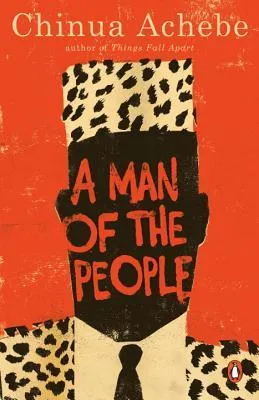A Man of the People

Unlocking the Tapestry of Society: A Dive into Chinua Achebe's "A Man of the People"
In the vast realm of African literature, Chinua Achebe's "A Man of the People" stands as a compelling narrative that takes readers on a thought-provoking journey through the intricate tapestry of society. Achebe, a literary maestro, skillfully weaves a tale that reflects not just the political landscape of post-colonial Africa but also delves into the human condition itself.
Navigating the Political Maze
One of the book's central themes revolves around politics, a topic that resonates universally. Through the lens of the protagonist, Odili Samalu, Achebe paints a vivid picture of political intrigue and the precarious dance between power and corruption.
As I delved into the pages of "A Man of the People," I found myself drawn into the tumultuous world of Nigerian politics. Odili's journey from a politically naive schoolteacher to a reluctant participant in the political arena serves as a mirror reflecting the challenges and temptations that often accompany the pursuit of power.
Personal Reflections on Power and Corruption
Achebe's exploration of corruption struck a chord with me, prompting reflections on my own encounters with the nuances of power. I couldn't help but recall a workplace scenario where the allure of authority led to questionable decisions. Achebe's portrayal of Chief Nanga, a charismatic but morally bankrupt politician, served as a cautionary tale about the seductive nature of power.
The Complexity of Relationships
Beyond the political landscape, "A Man of the People" masterfully unravels the complexities of human relationships. The interplay between characters brings forth the frailty of trust and the unpredictable nature of alliances.
In my own life, I've witnessed friendships tested by unexpected twists and turns. Achebe's characters, with their intricate web of connections and betrayals, resonated with me, highlighting the fragility of bonds in the face of conflicting interests.
Language as a Reflective Tool
Achebe's narrative style, rich in indigenous language and cultural nuances, adds another layer of authenticity to the story. The use of language becomes a vehicle for exploring the clash between tradition and modernity, a theme that echoes throughout the book.
I couldn't help but appreciate how Achebe skillfully wove Igbo expressions into the dialogue, immersing me in the cultural fabric of the narrative. It served as a reminder of the importance of preserving linguistic diversity in the face of globalized influences.
A Timeless Relevance
Despite being written in the 1960s, "A Man of the People" remains remarkably relevant. The issues Achebe addresses – political instability, the erosion of trust, and the struggle for identity – continue to resonate across different corners of the world.
As I turned the pages, I couldn't help but draw parallels between the fictional world of Nigeria and the challenges faced by contemporary societies. Achebe's timeless narrative serves as a testament to the enduring nature of human struggles, inviting readers to reflect on the state of their own communities.
Conclusion: Achebe's Enduring Legacy
In "A Man of the People," Chinua Achebe crafts a literary masterpiece that transcends the boundaries of time and geography. His keen insights into the human psyche, coupled with a narrative that skillfully captures the complexities of society, make this novel a timeless gem.
So, whether you're a literature enthusiast, a political observer, or someone navigating the intricate web of human relationships, "A Man of the People" has something profound to offer. As I closed the book, I couldn't help but feel a renewed sense of appreciation for the power of storytelling to illuminate the shadows of our shared human experience.
Now, as you embark on your own journey through the pages of "A Man of the People," may you find inspiration and insight, just as I did.